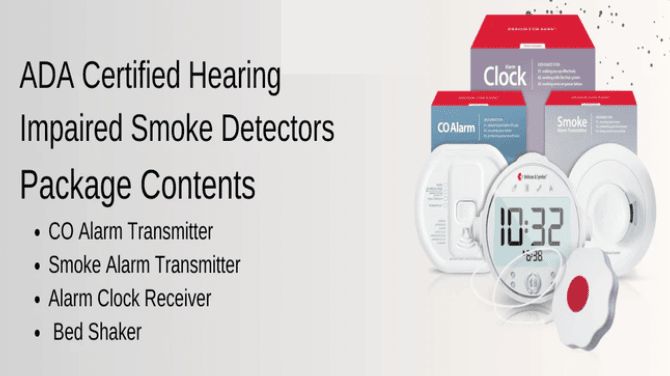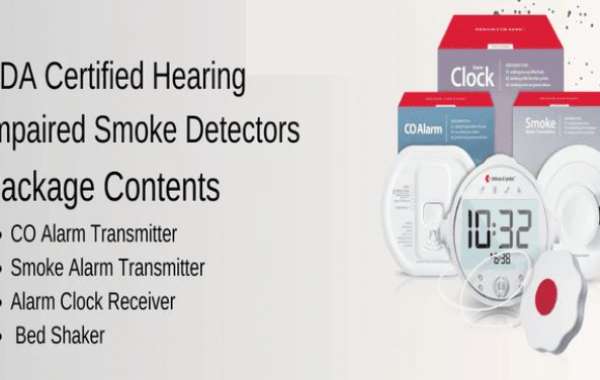For individuals who are deaf or hearing impaired, traditional smoke detectors may not provide adequate protection in emergencies. However, with the advancement of smart technology, hearing impaired smoke detectors are now designed to provide enhanced safety through innovative alert systems. These often ADA-certified detectors ensure that people with hearing disabilities can respond swiftly in case of fire or other emergencies. In this article, we'll explore the importance of these devices, how they work, and why they are a must-have for any home looking to create a safer environment for individuals with hearing impairments.

Why Traditional Smoke Detectors Fall Short
Standard smoke detectors use loud, high-pitched sounds to alert residents of danger. This type of warning is ineffective for individuals with hearing impairments, putting them at a much higher risk during emergencies. As per the Americans with Disabilities Act (ADA), smoke detectors must accommodate all individuals, including those who are deaf or hard of hearing, to ensure their safety.
This is where ADA certified smoke detectors for the hearing impaired come in. These devices offer life-saving solutions that provide non-auditory alerts through flashing lights, vibrations, and even integration with smart home systems. These devices ensure that everyone can maintain a safe home environment regardless of their hearing ability.
How Do Hearing Impaired Smoke Detectors Work?
Hearing impaired smoke detectors are designed to use multiple alert mechanisms that go beyond sound. Here's how they typically function:
- Visual Alerts: Many hearing impaired smoke detectors come equipped with bright strobe lights that flash when smoke or fire is detected. These lights are powerful enough to catch the attention of individuals, even from a distance, ensuring they don't miss an emergency alert.
- Vibration Alerts: Some devices include vibrating alarms that can be placed under pillows or mattresses. These devices vibrate strongly when activated, waking individuals who might not see a flashing light, especially if they are sleeping or in another room.
- Smart Alerts: Advanced detectors integrate with smart home systems, sending notifications directly to smartphones, smartwatches, or other devices. This ensures that individuals are alerted immediately, regardless of where they are in the home.
- Combination Detectors: Many devices offer a combination of sound, light, and vibration alerts. These hybrid models are ideal for mixed households where some members may not have hearing impairments, but all require adequate protection.
Recommended Smoke Detectors for the Hearing-Impaired
There are some different featured smoke detectors with different variations.
Smoke/Fire and Carbon Monoxide Alarm Notification System | with Flash Receiver and Bed Shaker
Package Content:
- CO Alarm Transmitter
- Smoke Alarm Transmitter
- Flash Receiver
- Bed Shaker
Smoke/Fire Alarm Notification System | with Alarm Clock Receiver and Bed Shaker
Package Content:
- Smoke Alarm Transmitter
- Alarm Clock Receiver
- Bed Shaker
ADA Smoke/Fire and Carbon Monoxide Alarm Notification System | with Alarm Clock Receiver and Bed Shaker
Package Content:
- CO Alarm Transmitter
- Smoke Alarm Transmitter
- Alarm Clock Receiver
- Bed Shaker
ADA Certified Smoke Detectors: Ensuring Compliance and Safety
The ADA (Americans with Disabilities Act) mandates that businesses and public spaces accommodate people with disabilities, including providing appropriate alerting systems for the hearing impaired. Although these regulations apply to commercial spaces, many tech companies are also developing ADA-certified smoke detectors for residential use. These certifications ensure that the smoke detector meets strict standards and provides reliable, life-saving features for people with hearing loss.
Having an ADA-certified smoke detector in your home offers peace of mind, ensuring you and your loved ones are protected in an emergency. These devices are designed to be inclusive and practical, with features that cater to specific needs.
The Importance of Smart Home Integration
In the age of intelligent technology, staying connected and protected is easier than ever. Modern hearing impaired smoke detectors often come with the ability to integrate seamlessly into smart home ecosystems. Here are a few key benefits:
- Instant Notifications: By integrating the smoke detector with your smart home system, you can receive instant alerts on your smartphone, ensuring you're always aware of potential dangers even if you're not at home.
- Voice Assistant Compatibility: Some detectors can sync with voice assistants like Amazon Alexa or Google Assistant, enabling you to control settings, check the battery, and get updates on the detector's status using voice commands.
- Automation: Smart detectors can trigger other safety measures, such as turning on lights, unlocking doors, or activating home security systems to facilitate safe evacuation during an emergency.
These intelligent features improve home safety and add convenience and flexibility to managing your environment.
Why Invest in Hearing Impaired Smoke Detectors?
Investing in a hearing impaired smoke detector is crucial for any household where safety for individuals with hearing impairments is a priority. Here's why these detectors are a wise investment:
- Enhanced Safety: A traditional smoke detector may not wake or alert someone with hearing loss, especially at night. Devices with visual and vibration alerts ensure the safety of all family members.
- Peace of Mind: Knowing that your smoke detector is ADA-certified and explicitly designed for individuals with hearing impairments offers unparalleled peace of mind.
- Inclusive Living: Using smart smoke detectors designed for deaf people creates an inclusive, secure living environment. This is especially important for households with mixed abilities.
- Long-Term Value: Many hearing impaired smoke detectors have long-lasting batteries and intelligent features that can help detect issues before they become serious problems, such as low battery alerts and malfunction notifications sent directly to your phone.
Features to Look for in Hearing Impaired Smoke Detectors
When choosing a smoke detector for individuals with hearing impairments, here are some essential features to look for:
- Strobe Lighting: Bright, flashing lights that are impossible to miss.
- Vibrating Alarms: Devices placed under a mattress or pillow to alert through vibrations.
- Smart Technology: Integration with smart home systems for remote alerts and automation.
- Battery Backup: A backup battery feature ensures the device will continue working even during a power outage.
- Combination Alarms: Devices that offer a mix of sound, light, and vibration alerts to cater to different needs.
Conclusion: Prioritizing Safety for All
For individuals who are deaf or hard of hearing, having a reliable, ADA-certified smoke detector is more than just a good idea—it's a necessity. These devices provide advanced alerts to ensure no one is vulnerable during an emergency. Whether through flashing lights, strong vibrations, or smart home notifications, these detectors help create a safer, more inclusive home environment.
Investing in a hearing-impaired smoke detector is an investment in safety, security, and peace of mind for you and your family. As technology continues to advance, integrating these devices into your home becomes easier and more accessible. Make the smart choice—prioritize safety and ensure everyone in your household is protected.




